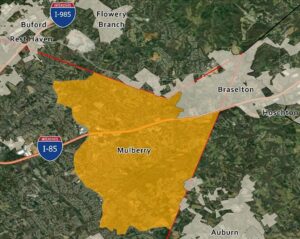JAN. 9, 2024 | Gwinnett could get its 17th city in 2024 if a proposed bill to come before the Georgia General Assembly is successful. Under the proposal, the city would be named Mulberry, consisting of land on both sides Interstate 85 in northeast Gwinnett, including the Hamilton Mill area. It would consist of 29.5 square miles and would abut both Hall and Barrow counties, as well as the City of Braselton, and would have the largest land area in Gwinnett. It would be created similar to the model when Peachtree Corners was incorporated, and would operate with no city property taxes.

To read feasibility study of new city, click here.
It was a potential land zoning issue where a developer planned a 700-unit apartment complex near Seckinger High School that upset local residents and brought about consideration of a new city. The proposed bill to enact a new city is being led by local legislators Rep. Chuck Efstration and Sen. Clint Dixon.
Efstration told GwinnettForum he hopes to see the bill move quickly through the Legislature, so that the proposal would be voted on by Mulberry-area residents in the May 21, 2024, General Primary. If so, the first city officials could be elected in the November 2024 General Election to take office on Jan. 1, 2025.
Among the data of the area from a feasibility study about the proposed city:
- The proposed population would be 41,125, second only to Peachtree Corners, whose population is 42,127.
- City services would be limited to planning and zoning, stormwater management and inspections, essentially a “city lite” model. However, after incorporation, city officials could add other services.
- It would consist of 13,000 acres.
- Household income would be $121,200, the most affluent of any city in Gwinnett.
- Households in the proposed area are mostly single family, detached units.
- Students of the area attend the Mill Creek and Seckinger clusters.
- The 1.5 million square feet of commercial buildings in the proposed area generate $307 million in retail sales.
- The feasibility study concluded that the proposed city is financially feasible, and would have an initial first year budget of $9.4 million. Such funds would come from franchise and premium fees (cable TV, insurance, financial institutions and businesses), building permits and inspections and alcohol sales.
The feasibility study was conducted by the KB Advisory Group of Atlanta in December 2023.
Efstration, who is the House majority leader, says: ““After receiving feedback and community input at five meetings and town halls in my district over the past several months, I’m excited to introduce legislation that will help give my constituents the local control over planning and zoning they’ve been seeking. I look forward to working with partners in the House, Senate and local community to fight back against the out of control growth and traffic congestion issues plaguing northeastern Gwinnett.”
The name “Mulberry” was chosen since one of Gwinnett County’s parks, Little Mulberry, is within the boundaries, as well as Mulberry Lake. The Mulberry River also flows nearby.
While other 16 cities of Gwinnett receive income from the Special Purpose Local Option Sales Tax (SPLOST), the new city would not immediately get this revenue. That’s because the current cities worked out an agreement with the county on how the 1% SPLOST tax revenues would be split. However, it is expected that eventually the new city would get such revenues, which could amount to $6 million annually. However, such monies would have to be spent on capital outlay projects, and not spent on city routine operations. –eeb
- Have a comment? Send to: elliott@brack.net











Follow Us